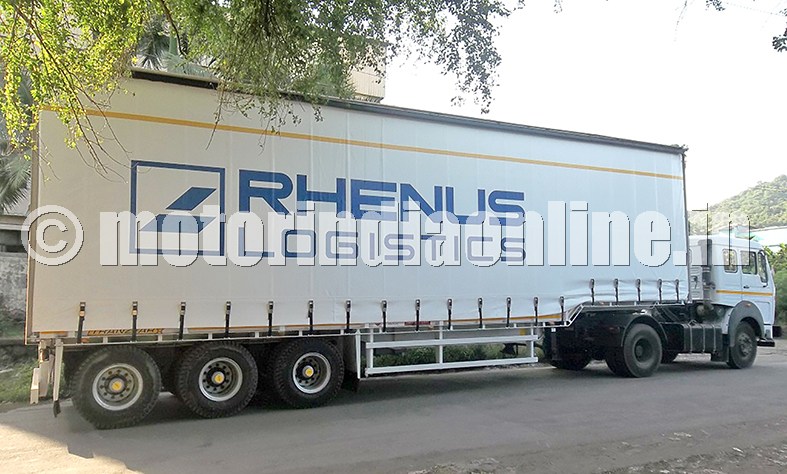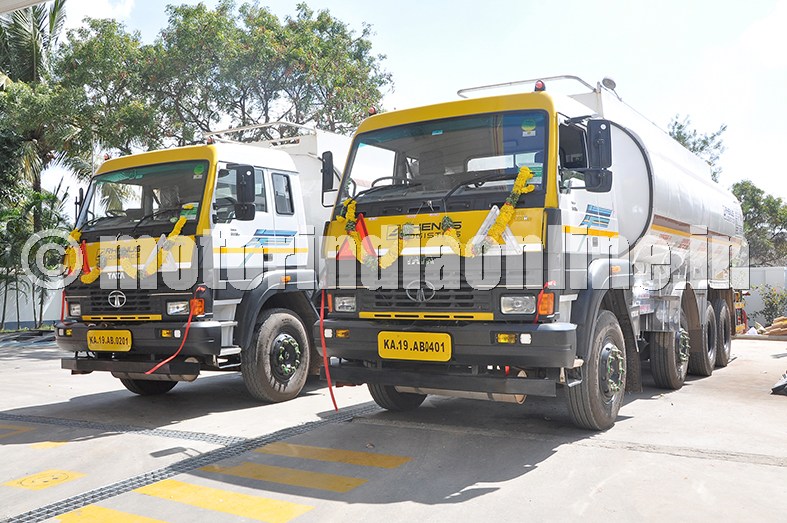Rhenus India is a joint venture between the six decade old Western Arya Group and 105-year old Rhenus Logistics, established in 2010. Its Business Units include Air & Ocean, Custom Brokerage, Contract Logistics, Domestic Freight and Hi-Tech Logistics, making it a unique integrated logistics service provider offering end-to-end solutions in-house.

Rhenus India employs more than 1,100 people across 54 locations in the country and has about 1,100,000 sq. ft. of warehousing space, with dedicated HSE personnel deployed to ensure complete compliance to norms. The firm has 200+ vehicles in its fleet which includes trailers, tankers for fuel & lubricant transportation, containerized trucks, etc., and since it operates own, attached and market-hired fleet, it runs an average of 4,000 vehicles of different type and capacity per month from the market.
Serving predominantly the chemical & petrochemical industry, Rhenus transports fuels (petrol, diesel & ATF), lubricants in Rhenus-dedicated tank trucks and deploys attached/market vehicles for other customers which includes FMCG, seeds and other allied industries. The outfit is majorly into primary segment moving bulk cargo from plants and warehouses across the country and also transporting EXIM cargo from gateway ports to various plants and back.
With over 90 per cent of its fleet comprised by Tata Motors, the rest of the vehicles are from AMW, Volvo and Eicher.
Being a service provider with all-India presence, Rhenus India’s major movements originate from Mumbai, Chennai, Gurgaon, Baroda, Ahmedabad, Hyderabad, Ludhiana, and Pune to all parts of the country. Rhenus’ oil tankers are mainly based in Mangalore, Mahape & Jamnagar, handling primary as well as secondary movement in a controlled environment.
Mr. Sanjay Randive, Director ILS & Special Projects, Rhenus India, tells us about the logistics firm’s growth prospects, expected impact from GST, road ahead for the sector and more.
Excerpts:
2016 performance highlights
2016 was a very promising year for us both in terms of revenue as well as recognition by our customers. Most of our clientele are global organizations and have the same values on EHS that we follow. We were appreciated by many of our customers for our focus on safe transportation, which is a way of life at Rhenus. We received various awards for operational excellence and safety during the year from organizations of international repute.
Plans and outlook for 2017
The first few months of 2017 were very promising not only for the Domestic Freight BU, but also for the whole of Rhenus India as we achieved budgets for all Bus. We look forward to continuing the upward trend and surpass our goals for the year. In this industry, since the market is very fragmented, opportunities to grow and acquire large customers always exist.
GST impact on logistics sector
The pros & cons of the effects of GST introduction are being debated largely as there is still no clarity on many of the issues. However, we are confident it will be a beneficial to all. As a logistics organization we expect improved transit times, savings on fuel, etc., due to lesser stoppages at State borders. However we are waiting for the final procedural draft to come out, applicable for the transport sector, which will decide as to what extent our working will be eased. Clarity on various parameters such as centralized or decentralized registration, place of service and place of billing related implications is yet to come.
Company’s GST-readiness
We as an organization are fully geared up for the change and our experts are keeping a close watch on the developments. We are hopeful that with the introduction of GST, many of the existing stringent documentation will be simplified; the transit time will reduce and would lead to cost savings for our customers as well as for Rhenus.
Technology adoption
We at Rhenus consider IT as one of our key differentiators and keep upgrading our systems. We have a web-based E-Fleet software in place, which takes care of driver and vehicle management and also keeps track of vehicle maintenance. Almost all company vehicles are fitted with GPS and are being monitored closely. We have well developed TMS which will enable us to move us in the role of LLP and implement even 4PL operations in transportation. All MIS reports are generated through the system and a dedicated resource has been deployed for this purpose. We keep ourselves updated with the latest developments in the field and try to implement the latest techniques.
Tackling driver shortage
This topic has been discussed and debated year after year, however we are yet to find a permanent solution. Unless we do enough to lure the young generation with better and respectable life style, we will continue to face this challenge. There also has to be adequate infrastructure on highways including lodging and boarding to attract employment for drivers. We are taking good care of drivers, and we do have second generation drivers continuing with us. However we have faced attrition of nearly 10%, resulting in shortage and vehicle underutilization/off road which is national waste.
Factors that would drive logistics sector growth
* Deployment of technology for improving optimization and efficiency and deployment of various BI tools for better decision making
* Improvement of infrastructure, leading to faster turnaround time
* Change in warehousing landscape/polarization post GST implementation will change the functioning of the logistics and transport Industry.

